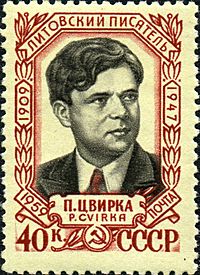Petras Cvirka facts for kids
Quick facts for kids
Petras Cvirka
|
|
|---|---|

A 1959 USSR stamp dedicated to Petras Cvirka
|
|
| Born | March 12, 1909 Klangai |
| Died | May 2, 1947 (aged 38) Vilnius |
| Signature | |
 |
|
Petras Cvirka (born March 12, 1909, in Klangai, Kovno Governorate; died May 2, 1947, in Vilnius) was a famous Lithuanian writer. He wrote many novels, children's books, and short stories.
He used many different pen names, which are special names writers use. Some of these were A. Cvingelis, Cezaris Petrėnas, J. K. Pavilionis, K. Cvirka, Kanapeikus, Kazys Gerutis, Klangis, Klangis Petras, Klangių Petras, L. P. Cvirka, Laumakys, P. Cvinglis, P. Cvirka-Rymantas, P. Gelmė, P. Veliuoniškis, Petras Serapinas, and S. Laumakys. His books have been translated into many languages, including English, Chinese, and Polish.
Contents
Petras Cvirka's Life
Petras Cvirka went to art school in Kaunas from 1926 to 1930. After finishing school, he decided to focus on writing instead of art. He started publishing his poems in 1924.
He studied literature in Paris in 1931 and 1932. He translated many books and shorter works from French into Lithuanian. Later, he traveled to places like Moscow, Leningrad, and other parts of western Europe.
In 1940, he joined the Communist Party. He supported Lithuania becoming part of the Soviet Union at that time.
When World War II started between Germany and the Soviet Union in 1941, he moved away from Lithuania. He lived in places like Alma-Ata and Moscow. There, he joined the Union of Writers of the USSR.
He returned to Lithuania in 1944. After coming back, he became the head of the Lithuanian Soviet Socialist Republic's Writer's Union. He also worked as an editor for a magazine called Pergalė, which means "Victory."
After Cvirka passed away in 1947, a monument was built in his honor in Vilnius. However, after Lithuania became independent again in 1990, some people wanted the monument removed. This was because of Cvirka's past support for the communist government.
His Books and Stories
Cvirka's writings often talked about social problems. But they also showed a deep love for nature. His works are known for being clever and having great conversations between characters.
Meisteris ir sūnūs
His novel Meisteris ir sūnūs (which means "The Master and Sons") shows Lithuanian folk art in a new way. It includes many details about old village life and traditions in Lithuania. It tries to turn rich spoken stories into written ones.
Žemė maitintoja
Another novel, Žemė maitintoja ("The Earth, Our Sustainer"), describes an ideal "new socialist person." This character is a young, determined farmer who gets land from a land reform. This reform divided up land that used to belong to rich families among poorer people. The farmer in the story doesn't have a strong emotional bond to his land. Instead, he sees the economic benefits of working together in collective farming. This book showed the kind of person the communist system wanted to create.
Frank Kruk
The two-volume book Frank Kruk is a funny story. It's about a Lithuanian immigrant named Pranas Krukelis who moves to the United States. He changes his name to Frank Kruk. Frank Kruk gets involved in criminal activities and takes advantage of other Lithuanian immigrants. This book was turned into a play in Klaipėda in 2003. The actor Vytautas Paukštė won an award for playing Kruk.
Pabučiavimas
Cvirka was also the first writer to talk about the Lithuanian partisans in his short story Pabučiavimas ("The Kiss"). These partisans were guerrilla fighters who fought against the Soviet government. This was one of his last works.
Images for kids
 | Lonnie Johnson |
 | Granville Woods |
 | Lewis Howard Latimer |
 | James West |


